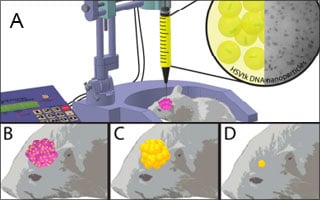Innovative nanoparticle gene therapy system eliminates cancerous brain cells

Despite decades of surgery, chemotherapy and radiation therpy treaments for glioma, a cure for this life-threatening brain cancer has remained elusive. In a study published on the website of the journal ACS Nano, BME Associate Professor Jordan Green and other Johns Hopkins researchers have successfully used compound-filled biodegradable nanoparticles to effectively kill brain cancer cells — and extend survival in rats.
The biodegradable nanoparticles filled with a DNA-encoded enzyme, herpes simplex virus type 1 thymidine kinase (HSVtk), proved to be potent in killing brain cancer cells. When researchers combined this with the compound ganciclovir, the loaded nanoparticles were 100 percent effective at killing glioma cells grown in laboratory dishes.
“We then evaluated the system in rats with glioma and found that by using a method called intracranial convection-enhanced delivery (a pressure gradient to enhance diffusion throughout the tumor), our nanoparticles could penetrate completely throughout the tumor following a single injection,” says Dr. Jordan Green. “ When combined with systemic administration of ganciclovir, rats with malignant glioma lived significantly longer than rats that did not receive this treatment.”
In addition, the findings show that nonviral DNA delivery of HSVtk combined with administration of ganciclovir has potent antitumor effects.
Green noted that additional safety and efficacy studies are needed before the treatment makes its way to the clinic. In its current form, Green envisions that the nanoparticles would be administered locally in the brain during the surgery that is commonly used to treat glioma. In the future, these nanoparticles may be able to be administered systemically rather than directly to the brain. The team is further looking to optimize the intracranial distribution of this new nanoparticle gene therapy strategy.
Other authors on the paper are Betty Tyler, Antonella Mangraviti, Stephany Y. Tzeng, Kristen L. Kozielski, Yuan Wang, Yike Jin, David Gullotti, Mariangela Pedone, Nitsa Buaron, Ann Liu, David R. Wilson, Sarah K. Hansen, Fausto J. Rodriguez, Guo-Dong Gao, Francesco DiMeco, Henry Brem and Alessandro Olivi.
This study was funded by the National Institute of Biomedical Imaging and Bioengineering (grant number 1R01EB016721).
